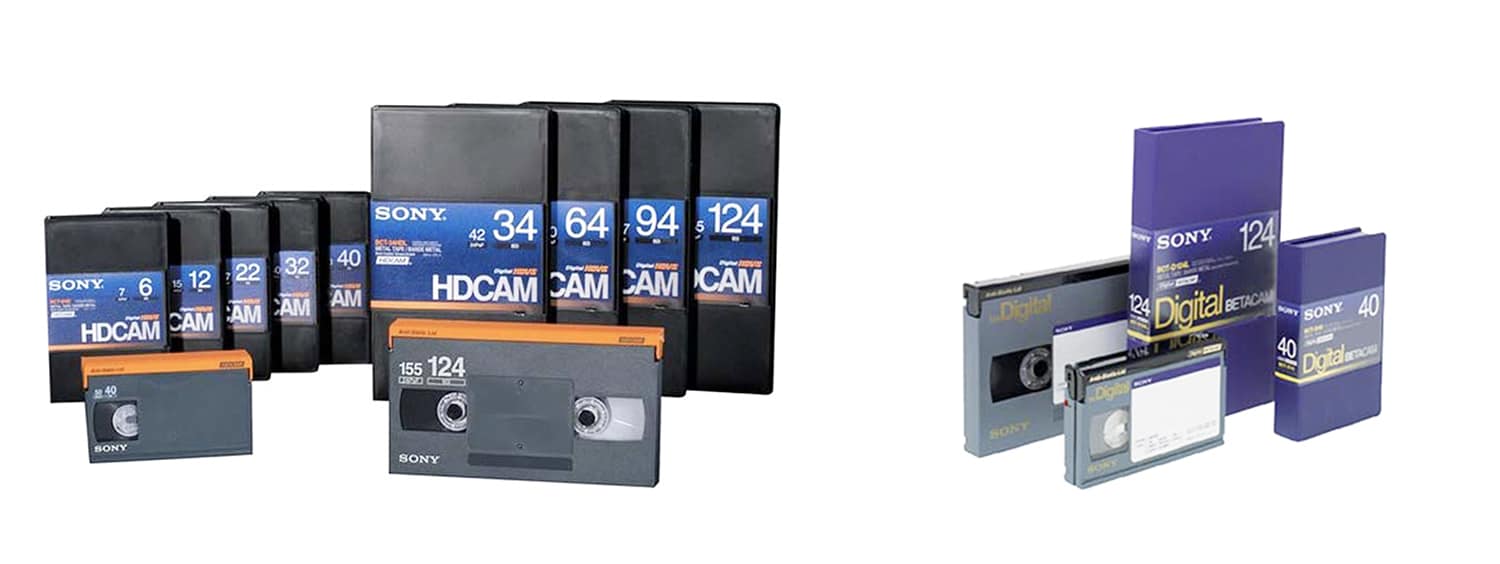REMEMBER VIDEOTAPE?
It wasn’t long ago that professional tape formats were the preferred method of storing and delivering content for home video (DVD & Blu-ray) and broadcast. Common modern formats include Digital Betacam (for standard-def content) as well as HDCAM, HDCAMSR, and D5 (for high-def content). These formats are high-quality, but also expensive, bulky, and prone to damage during shipping or due to mishandling. Not only that, but the tape decks required to work with these formats are very expensive and complicated, so specialty facilities and personnel were (and still are) needed to work with them.
TAPE DOESN’T LAST FOREVER
Flash forward to today, a time where tape has been almost totally replaced by digital files. Meanwhile, these cassettes of yester-year still exist on shelves; entire libraries of older titles, sitting in vaults or basements, unused and wasting away. Tape-based media has a very literal “shelf life.” In other words, this media starts to degrade over time, either chemically or magnetically. Sony (manufacturer of Digital Betacam, HDCAM, and HDCAM SR) predicts that, if stored at a constant temperature between 59 degrees Fahrenheit (15 degrees C) and 77 degrees Fahrenheit (25 degrees C), and at a relative humidity between 40-60%, modern tape should last 15+ years without significant degradation. Here’s the thing, though. Most people don’t have climate-controlled vaults so, in reality, these tapes will likely degrade quicker than that. Eventually, the content in the cassettes will be in such bad shape that nothing can be recovered. It could be 15 years, it could be 20, it may even be more. One thing is for certain, though — those old tapes will be totally unusable some day in the near future.
TAPE IS WORTHLESS WITHOUT A DECK TO PLAY IT
Since tape is no longer a common format, many facilities have stopped the expensive maintenance of their tape-based equipment, or gotten rid of it altogether. Further, the experienced techs needed to operate these insanely complicated decks are getting older and retiring, sometimes without properly trained staff to replace them. As that happens, it’s becoming increasingly harder to find a company that can properly, and cost-effectively, convert tape to file, especially the older analog formats like Betacam SP, half-inch, Umatic, D1, D2, D3, etc.
STOP LEAVING MONEY ON THE TABLE…AND THE SHELF
Not worried about losing your content to time? Then think about it this way: you may literally be leaving money on the table…er, shelf. Why leave that series, feature, or documentary sitting in a dark room, wasting away, when you could use it to open up a new revenue stream, like Video on Demand (“VOD”)? The cost and ease of entry to major VOD platforms, whether it be iTunes, Amazon Prime, Google Play, Fandango Now, or any of the others, is now lower than ever, and those platforms are hungry for content. Blackwater Digital is ready to help you convert your tape to file and get it out to a wide audience, making you money. Further info about our tape and mastering services is available here.

Blackwater is your one-stop-shop for tape-to-file services and all forms of mastering. We transfer content from Betacam SP, Digital Betacam, DVCAM, DVCPro, D5, HDCAM, HDCAM SR, and legacy formats such a U-matic, D1, D2, D3, and D9. Get in touch today for further info on how we can help!
